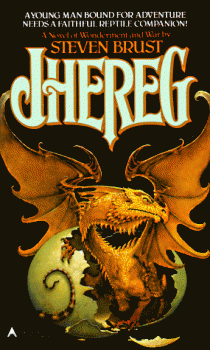A Review of Jhereg by Steven Brust
 Jhereg
Jhereg
By Steven Brust
Ace (224 pages, $2.50, April 1983)
I’ve played in a lot of tabletop RPGs, including a couple of homebrewed systems and homebrewed worlds. I’ve never encountered one that goes into the culture-changing potential of resurrection, though. It’s treated as an acceptable break from reality, a way to keep things fun, one that has little effect on the world besides providing a way for the campaign’s archnemesis to keep coming back.
Jhereg, by Steven Brust, the first book in his 12-volume Vlad Taltos series, takes the notion of reliable magical resurrection and creates a society around it.
Vlad Taltos is an Easterner and a gentleman, which isn’t a common combination. Easterners are an underclass compared to Dragaerans. The Dragaeran clan called House Jhereg allows anyone, even Easterners, to buy in — a distinct advantage, since it allows them access to the Dragaeran Empire’s sorcery. Unfortunately, the Jheregs may be the most egalitarian family in the Empire, but they also operate a lot like the mafia. Citizenship is not cheap.
In addition to his membership in House Jhereg, Vlad is a successful assassin, which means something quite different in a world where people can be reliably brought back from the dead. “Standard” assassinations are just pointed warnings. This is a world where duels are incredibly common, where one of Vlad’s friends can be described as “one of the most bloodthirsty bastards I have ever met,” without any moral consequences to speak of.
Assassins are also hired to make people permanently dead, from time to time, but even this doesn’t have quite the impact it would in this world; reincarnation is a well-established fact. There is a way to kill peoples’ souls, but Vlad opines — perhaps optimistically — that even an assassin would need a very, very good reason to do it.
Unfortunately, Vlad is about to get involved in a very high-stakes game. One of the leaders of House Jhereg sends him after a thief who could threaten the House’s livelihood. What follows is somewhere between a tale of court intrigue — oaths, honor, and House are very important in the Empire, far more important than life — and a criminal caper story. The antagonist, Mellar, has found a hiding place where assassinating him would put House Jhereg at war with another powerful House. Not assassinating him would probably destroy House Jhereg and would definitely cost Vlad his life, permanently. To resolve the dilemma, Vlad must navigate a maze of twitchy Dragaeran honor, figure out exactly what a Dragaeran’s House means, and work out what Mellar really wants.
Since this is a proper criminal caper story, he’s not alone, of course. He has a faithful and oddly unnoticable assistant, a dangerously curious sorcerer, a master thief, several friends from the House of the Dragon, his wife — not a woman to be underestimated — and, last but not least, his familiar. The familiar, Loiosh, is a small-j jhereg, a small winged reptilian with deadly poison, humanlike intelligence, and a tendency for leaving dead tecklas on Vlad’s pillow. (I’m still not sure whether tecklas are more closely analogous to mice or rabbits. They’re a small, skittish herbivore, and the House that’s named after them is held in contempt by most Dragaerans.)
It’s worth noting that this book has a few science fictional elements. The Dragaerans, with their House characteristics and their sorcery, are said to be the product of ancient experimentation. Thus, this book may not be for people who want their fantasy to be pure fantasy. It also isn’t for people who want blameless heroes. It is a good fit for people who like their narration casual and conversational, their societies convoluted, their criminals quick-witted, and their protagonists just a bit shady.
I love this series. Later books do show Vlad wrestling with moral questions, doing what’s right as opposed to doing what’s most profitable, but he’s still not exactly a knight in shining armor.